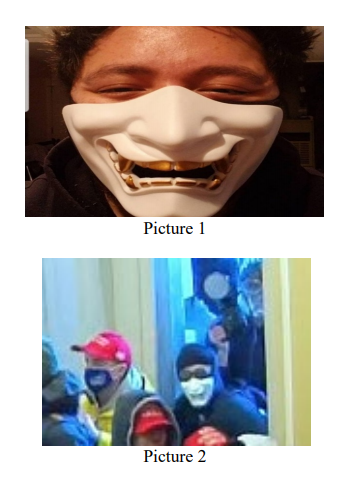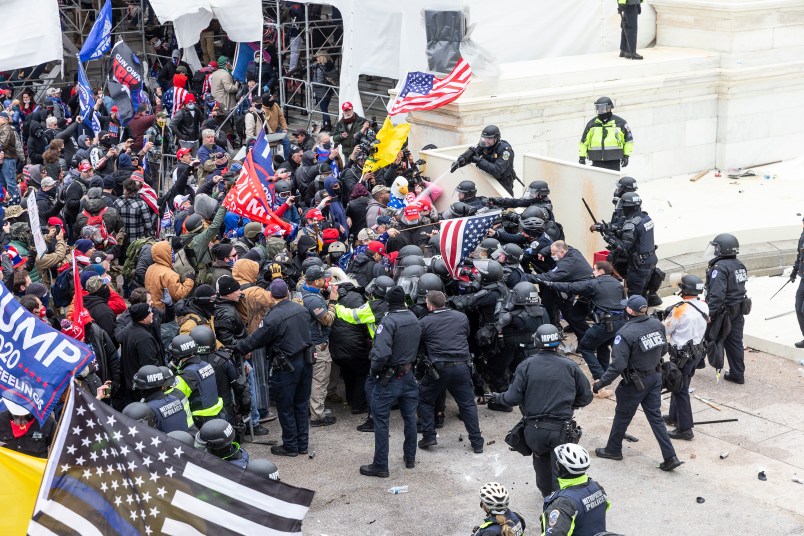A new defendant in the Jan. 6 Capitol attack case needs better friends.
According to court records filed over last week and recently unsealed, Fi Duong spilled some allegedly incriminating evidence to an undercover FBI employee — a source he was introduced to by an undercover Metropolitan Police Department employee he’d met at the Jan. 6 Capitol riot.
In addition to the Capitol attack itself, Duong allegedly spoke at length to the undercover FBI employee about making Molotov cocktails, and even mused about breaking Jan. 6 defendants out of custody.
“I was right in front when they smashed the doors,” he allegedly bragged to the FBI employee in a late-March conversation, according to an FBI agent’s affidavit. “I also got footage of the Capital Police [sic] shooting the rubber bullets at us.”
The revelation that prosecutors are employing information from undercover law enforcement sources — first flagged by researcher Seamus Hughes Tuesday — marks a new chapter in the ongoing investigation of the Jan. 6 insurrection, six months after a pro-Trump mob attacked Congress.
According to the affidavit, Duong and an associate of his (“Associate 1” in the court records) introduced themselves to the undercover MPD employee in the vicinity of Freedom Plaza — in between the White House and Congress — on Jan. 6. Duong allegedly told the undercover employee that he was an “operator.” Later that day, the undercover MPD employee allegedly came across Duong in a restricted zone, on the Capitol’s west terrace.
A few days later, on Jan. 13, the undercover MPD employee introduced Duong to the undercover FBI employee, who was labeled the “UCE” in the affidavit. The FBI built a relationship with Duong that lasted several months, and documented some startling admissions, according to the affidavit, including the alleged admission that he’d entered the Capitol on Jan. 6.
Crucially, Duong allegedly discussed wearing a White, Japanese-style mask during the attack. And the FBI agent’s affidavit last week pointed to Telegram photos and surveillance camera footage seemingly identifying Duong.

Duong faces charges of knowingly entering or remaining in a restricted building or grounds; knowingly engaging in disorderly conduct in order to impede the orderly conduct of government business; disorderly conduct on Capitol grounds; and obstruction of an official proceeding.
According to Duong’s court record, a judge granted his motion to be released from custody in a hearing Friday. “Government does not oppose the Defendant’s release with conditions,” the court record noted, though The Washington Post reported that prosecutors sought stricter terms for Duong’s release.
‘You go to the prisons and you break them out’
The law enforcement investigation of Duong lasted several months and included some troubling discussion of further violence in the name of Duong’s cause, according to the court records.
For example, on March 31, after allegedly discussing his activities during the Capitol riot, Duong raised the possibility of a mass jail-break to the UCE.
“I see that as an opportunity,” Duong allegedly said after the UCE noted that several alleged rioters were behind bars. “With every great revolution, you go to the prisons and you break them out. It’s just a matter of figuring out where the prisons are and that should all be public information.”
“In theory, how many of those guards are equipped in a sense of protecting people from breaking into prison…in theory, if we needed to break people out of prison to add to our numbers, to add to the rank, or even to, hell, to sow discord…what that does is add stress to the system.”
Sometime in the weeks following the attack, Duong also allegedly described the political atmosphere in the U.S. to a group of likeminded associates as “what could be called the second American Civil war.”
And In May, Duong allegedly said he measured all the landmarks on his family’s property — “So I know if the federales ever come and they’re standing at one of my designated spots, I know exactly what distance they’re at.” He added later: “If anyone’s ever shot at a hundred yards with a rifle, it’s cake.”
‘All those boxes of wine bottles’
As the months ticked on, Duong’s luck grew worse: At a group meeting in May, he allegedly discussed making mustard gas and bombs. After “Associate 1” mentioned “CS MRE bombs” and said they would constitute a felony, Duong referenced boxes full of glass bottles that he had in his house.
“Uh, why the hell you think I have all those boxes of wine bottles there?” he said.
“I would not [he then sarcastically coughed], I would not think to put in a little bit of Styrofoam, a little bit of motor oil, and some gasoline in said wine bottles,” he added later, as quoted by the affidavit. “I wouldn’t have the first thought of doing that whatsoever.”
After Associate 1 said, “You can get away with it. I can’t. If I do that, I’m a white supremacist,” Duong allegedly responded, “I’ll claim the mental illness.”
What followed was several weeks of the undercover FBI agent prodding Duong about his interest in Molotov cocktails. (U.S. Magistrate Judge G. Michael Harvey noted in the hearing Friday that the undercover FBI agent “gave him every opportunity to step over the line, and at every point he chose not to,” the Post reported.)
Finally, in June, UCE allegedly asked Duong about testing the Molotov cocktails at a former prison. Duong agreed to “check it out.” But once there, he allegedly expressed some concern about the evidence such tests would leave behind — specifically, broken glass — and mused, “I was wondering, if there’s a way we could do it legitimately, like if we wanted to host a training event here. Would that be possible thru Fairfax County?”
Alas, he would be arrested soon anyway, for a separate alleged crime.
This post has been updated.







So he discussed making bombs and breaking people out of jail and they released him pending trial? Did I read that right?
Tourists.
Now see those 01/06 rioters aren’t racists, nope not one bit.
I bet this “operator” has all the best skins and aimbot hacks.
These people are as dumb as stumps. Good thing.